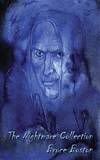The Nightmare Collection / Bruce Boston
 Dark Regions Press / August 2008
Dark Regions Press / August 2008
Reviewed by: Rich Ristow
No ideas but in things, William Carlos Williams once famously wrote in his long collage poem Patterson. Over the years, the idea has morphed into the creative writing workshop mantra of Show, don’t tell. Still, it’s important to consider Williams, even all these decades after his passing. For all the possibilities of lyric poetry, things are more interesting than emotions. Without things, a poem just becomes a raw bundle of feeling, and who finds that interesting, other than the novice who scribbled it? It’s like the failure of a would-be performance /slam poet, in Huntington, West Virginia (who shall remain nameless), who had nothing really interesting to say, so he just pranced around a stage shouting, Fuck you, you fucking fuck! His sloppy rhyme on uck sounds didn’t help his case either. It should be an eternal rule of poetry: never rhyme “fucking fuck” with “flat billed duck.” True, one can’t have a lyric poetry devoid of emotion, but it’s the things that ground the reader and give emotion context. This is something that largely transcends most poetic genres. Classical, new formalist, contemporary free-verse – most good poetry is grounded in something tactile. How it’s grounded leads to the various content descriptions out there, like speculative poetry.
That leads to something else, inevitably. Speculative poetry is not a formal genre, just like “feminist poetry” and “African American poetry” are not formal genres. Those words are mere content labels, and not a description of aesthetic nuts and bolts. Marilynn Hacker’s metrics is just as feminist as Adrienne Rich’s free verse. Claude McKay was just as African-American as Langston Hughes or Reginald Shepard – the three, in terms of prosody, almost live on different planets. Which brings me, rather nicely, back to speculative poetry. One could play the game of comparison, but for the sake of ease, it just might be easier to point to Bruce Boston’s The Nightmare Collection.
The book absolutely contains speculative content, and while there are certain constructive qualities that thread their way through the collection, there’s no über Bruce Boston poem. He sometimes writes in rhyme, and other times in free verse or poetic prose. This isn’t a case of a writerly multiple personality disorder. One gets the sense that Boston approaches issues of form the way a mechanic or carpenter approaches their tool kit. Instead of sticking to one approach, Boston merely uses what works for him.
Sometimes, Boston writes like an early Williams, long before the collage poetics of Patterson. Poems like “Dark Gourmet,” “Bone People,” and “White Whale” narrowly stretch down the page with short lines and stanza breaks making ample use of the white space around. Each concrete line spells out a thought or image building to the end, where everything locks together nicely. In other places, Boston is more comfortable with prose, like in “Interrogation at City Gate,” “Futurity Wears The Head,” and “Cold Letter to the Children.” These poems benefit from the longer, more prosaic line, and had Boston used stripped-down lineation, they wouldn’t work.
There are also works that employ rhyme in The Nightmare Collection, but all this talk of form is more a mere exploration of Boston’s uses of different organizational principles. A speculative nature is consistent throughout. Most obviously, it comes across in a series of variations that open with “If _______ / where the world.” For example:
If cockroach people
were the world
our population would
multiply unchecked,
Also:
If lice people
were the world
we would cultivate
vast fields of flesh,
There are many others within the collection that start with conjecture and then moves on to envision the resulting implications. Boston speculates on, among others crow people, cat people, werewolves, and, as shown above, cockroach and lice people. The spirit of speculation carries one, but not every poem within The Nightmare Collection fits the opening formula of the mentioned variations.
There’s work here that reads like comes straight from the bizarro camp. (Honestly, “vast fields of flesh” struck me, personally, as a happy coincidence, as I’ve recently been reading Carlton Mellick III’s Teeth and Tongue Landscape) “Surreal Births” details a woman giving birth to a dog, and they afterbirth comes in the form puppy chow. There’s also Boston’s sense of humor, like in “Avocado Horror” which starts off praising the green fruit, but then ends up using it as a garnish for cannibalism.
Certain elements of craft do transcend the issue of shape and assist the sense of speculation. It doesn't matter whether Boston rhymes, alliterates in free verse, or employs the poetic sentence. There's a strong sense of clarity within The Nightmare Collection. Again, this comes back to Williams famous little dictum. The collection bristles with things. Vivid imagery abounds, which is fundamentally needed. Speculation is an abstract action. Without grounding the reader, in, say, Boston's “Surreal Office” where the arm rests are arms and the sofa is a lap, the poetry would just be a loose bundle of ideas, and that would be boring – as boring as a collection where the writer was more concerned with communicating their feelings than speaking a language of evocative imagery. Boston does what any successful speculative poet should do. He puts the reader in weird, strange, landscapes; he gives a visual context for his ideas. In the end, it makes for a wild ride.
Purchase The Nightmare Collection by Bruce Boston.



